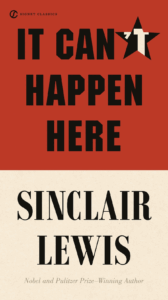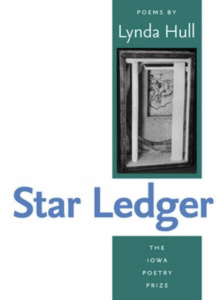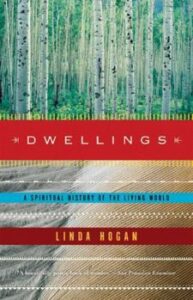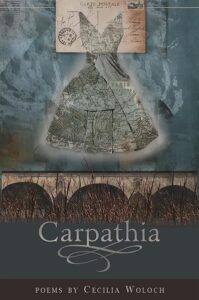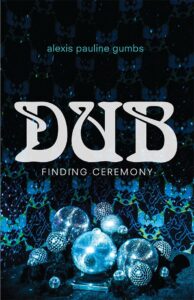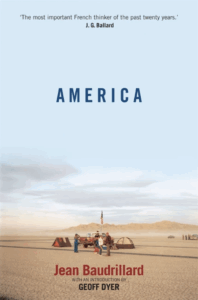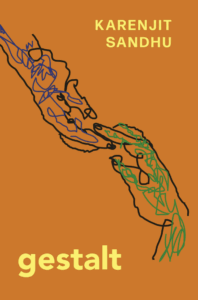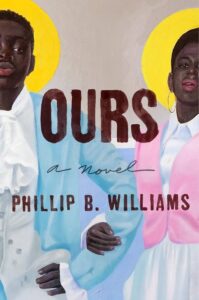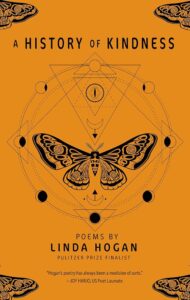
The Annotated Nightstand: What Khadijah Queen Is Reading Now, and Next
Featuring Linda Hogan, Alexis Pauline Gumbs, Sinclair Lewis, and Others
“No sea,” writes Khadijah Queen in Between the Devil and the Deep Blue Sea, “just flat land littered with generic strip malls and half-empty parking lots.” This is Queen’s description of Inkster, the small town in Michigan she is dragged to by her mother after her sun-filled childhood in LA. Queen’s mother, haunted by the loss of a son, uproots two daughters to try to save a third from addiction and help her grandchildren. The events Queen documents in these first pages may, in a less thoughtful or nuanced writer’s hand, flatten to stereotypes. Yet when Queen references a family member who is an alcoholic or struggles with severe mental illness, her love for them is explicit—and without a “but” connecting those two facts. It’s messy and loving, both.
Despite the love, Queen wants more. Education is a way out, and she begins chipping away at a degree—but even that gets taken away from her when her sister needs the car for a work shift at the same time as Queen’s classes. So much of Queen’s life in Between the Devil is without her permission—the move from Los Angeles, the work, the abandoning of a degree. This is also true after Queen unilaterally makes a life-changing decision. She has a chance encounter with a Navy recruiter who clocks her for what she is: capable, thoughtful, smart, and grounded. She could earn her degree for free. “I could do something no other woman in my family had done,” she writes, “that not a lot of women in general do, something that would take me out of the small-town retail job loop and away from the endless Inkster family drama.”
Of course, military life is hardly defined by agency (or dignity or privacy)—a rude awakening for Queen the minute she enters bootcamp. Through the pages, we whip through the intensity of training and Navy life, learning along with Queen the dehumanizing experiences they entail in the best of circumstances. That she is a woman and Black makes what might otherwise be difficult interactions charged with intersectional oppression. Then of course there is just the raw randomness of life thrown into relief, as when Queen avoids a deadly terrorist attack on her USS Cole that killed 17 people. (She was pregnant, so she left her ship.) Despite it all, Queen exits with a certainty about herself and her future.
Queen is also a poet, scholar, and prose writer, and her ear for music and sizzling intelligence are clear form page one. As the review of Between the Devil states in Kirkus, “[Queen] beautifully balances empathy for her past self with a trenchant analysis of the systems that shaped her life story.” (Queen also wrote about writing poetry while on a naval destroyer here on Lit Hub.)
Queen tells us about her to-read pile: “These are the books I’ve traveled with this spring and summer—in various stages of completion—and picked up along the way.”
*
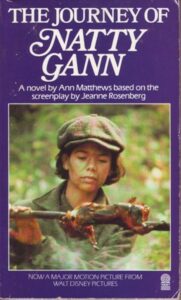
Ann Matthews, The Journey of Natty Gann
The cover of this book definitely unlocked some ancient image bank in my brain, if only because a Disney movie version came out in the 80s. Set in Chicago in the Great Depression, Natty Gann’s father, desperate for work, takes a job on the spot to log in the Pacific Northwest. Natty rides the rails with a wolf she saves from a dog fighting ring to find him.
Sinclair Lewis, It Can’t Happen Here
Lewis was the first American to win the Nobel in Literature. Alexander Nazaryan writes of It Can’t Happen Here in the New Yorker, ‘‘Sinclair Lewis published the novel as Adolf Hitler was making Germany great again, violating the Treaty of Versailles by establishing the Wehrmacht.” The novel “imagines the improbable election of an authoritarian named Buzz Windrip…Once in the White House, Windrip institutes a backcountry version of the fascism then creeping over Europe.”
Lynda Hull, Star Ledger
In her excellent essay on second poetry collections (which is certainly taking up a lot of my brain right now!), Lisa Russ Spaar writes in Los Angeles Review of Books of Hull’s sophomore title, “each poem…sounds with an anvil stroke of gorgeous, pain-freighted beauty and inevitability. Her line extends in this book, each richly fulfilling itself while gesturing both backward and ahead, panning out and moving close in with cinematic daring.”
Linda Hogan, Dwellings: A Spiritual History of the Living World
“What do we do when confronted with ‘a life apart from ours’?” ask Joanne Hearne in Western American Literature. “These essays trace the shape of belief and the tangled intellectual history of what we believe makes us human. ‘Dwellings’ not only refers to our physical home turf, but also to our spiritual and intellectual search for our place in the natural order of things.”
Cecilia Woloch, Carpathia
The jacket copy for this poetry collection states, “Well-controlled eulogies to her dying father in rural Kentucky, lush lyric and prose poems to lovers and former-lovers in Paris and various Eastern European countries, and compelling anaphoric-based narratives that meander between innocence and experience, body and soul—these are the motifs in Cecilia Woloch’s stirring collection.”
Alexis Pauline Gumbs, Dub: Finding Ceremony
The inimitable m. nourbeSe Philip says of Gumbs’s book: “Dub simultaneously contracts and expands to create a new form of proprioception, which allows us as a species, phantomed by the corrosive and lacerating actions of history, to locate ourselves in relation to other species, as well as within the time-space continuum of the yet to be, the now and the ‘past.’ Part prayer, oration, exhortation, commentary and story, Dub amplifies ancestral voices to become mythopoesis in the making.”
Jean Baudrillard, America (tr. Chris Turner)
Love to dig into old reviews! From James Marcus writes in his 1989 New York Times review, “Mr. Baudrillard’s goal is to define what he calls ‘astral America, not social and cultural America’…He escorts the reader through an abstract nation, one elaborately draped around a handful of leitmotifs—space, speed, cinema, technology and, most of all, the desert.”
Karenjit Sandhu, Gestalt
“gestalt is a poetic enquiry of the Panchayat, a collective of South Asian and Black artists/practitioners involved in communal archiving, artmaking and activism in Britain from 1988-2015,” the jacket copy for this book begins. “It is a score for performance holding a spotlight on questions of race, class, gender, colonisation, erasure and collective memory.”
Phillip B. Williams, Ours: A Novel
The award-winning poet describes his novel at PBS thusly: “It is a book about freedom, and what necessarily needs to be destroyed in order for freedom to be born. A conjure woman of great power annihilates plantations all over Arkansas and brings those she has freed to a town just north of St. Louis to live out their newfound freedom.”
Linda Hogan, A History of Kindness
In an interview with AJ Baumel at Southern Review of Books, Hogan says of this poetry collection and her writing, “For me, and maybe I am wrong, fight has more than one way to exist. Change has to happen. Maybe a book does make a difference, I hope. Maybe words can make change. They have in the past. So I search for the right ones. Maybe it is not of use, but sometimes it is.”
Diana Arterian
Diana Arterian is the author of the recent poetry collection Agrippina the Younger (Northwestern UP, 2025) and editor and co-translator of Smoke Drifts (World Poetry Books, 2025), a collection of Nadia Anjuman's poetry. A Poetry Editor at Noemi Press, Diana has received fellowships from the Banff Centre, Millay Arts, and Yaddo. She writes “The Annotated Nightstand” column at Lit Hub and lives in Los Angeles.









